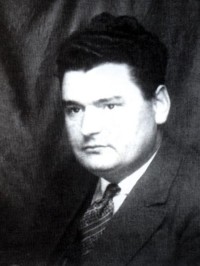Henryk Sławik
| Henryk Sławik | |
|---|---|

Henryk Sławik |
|
| Born | 1894 Timmendorf, German Empire (now part of Jastrzębie-Zdrój, Poland) |
| Died | 1944 Gusen concentration camp, Austria |
| Cause of death | Hanging |
| Nationality | Polish |
| Occupation | Politician |
| Known for | Holocaust rescue |
Henryk Sławik (16 July 1894 – 23 August 1944) was a Polish politician in the interwar period, social worker, activist, and diplomat, who during World War II helped save over 30,000 Polish refugees, including 5,000 Polish Jews in Budapest, Hungary by giving them false Polish passports with Catholic designation. He was executed with some of his fellow Polish activists on order of Reichsführer SS in concentration camp Gusen on 23 August 1944.
Henryk Sławik was born 16 July 1894 in Timmendorf (now Szeroka, a part of Jastrzębie-Zdrój), into an impoverished Polish Silesian family as one of its 5 children. He was sent by his mother to an academic secondary school. After graduation, Sławik left his hometown for Pszczyna where he was drafted to the army during World War I. Released from internment in 1918, he joined the Polish Socialist Party in Upper Silesia and went to Warsaw for additional training. He took active part in the Silesian Plebiscite as one of its organizers and began working as a journalist for Gazeta Robotnicza. A year later, he became its Editor-in-chief.
In 1922 Sławik was elected president of the Regional Chapter of the Worker's Youth Association "Siła" and took part in setting up Worker's Universities. In 1928 he married a Varsovian, Jadwiga Purzycka, and in 1929 was chosen as councillor for Katowice City Hall on PPS platform. He was an ardent opponent of Sanacja. Between 1934 and 1939 Sławik served as president of Polish Journalist Association of Silesia and Zagłębie (Syndykat Dziennikarzy Polskich Śląska i Zagłębia).
...
Wikipedia
